
Sibel Kekilli is a German actress. She gained public attention after starring in the 2004 film Head-On. She won two Lolas, the most prestigious German film award, for her performances in Head-On and When We Leave (2010). Beginning in 2011, she became more widely known for her role as Shae in the HBO series Game of Thrones.
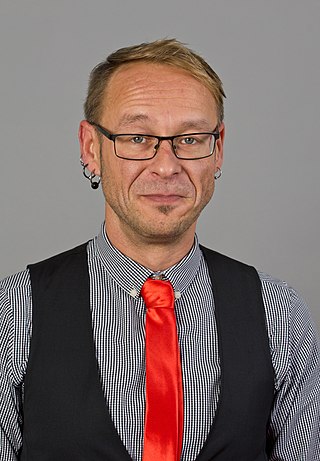
Carsten Schatz is a historian and a member of the Left Party in Germany.
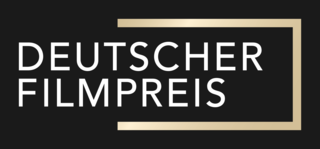
The German Film Award, also known as Lola after its prize statuette, is the national film award of Germany. It is presented at an annual ceremony honouring cinematic achievements in the German film industry. Besides being the most important film award in Germany, it is also the most highly endowed German cultural award, with cash prizes in its current 20 categories totalling nearly three million euros.

Peter Fleischmann was a German film director, screenwriter and producer. He worked also as an actor, cutter, sound engineer, interviewer and speaker. Fleischmann belonged to the New German Cinema of the 1960s and 1970s. He is known for directing the 1969 Jagdszenen aus Niederbayern, but he produced films of many genres.

Ulrich Matthes is a German actor. He is best known for having played Joseph Goebbels in the 2004 film Downfall.

Fred Breinersdorfer is a German screenwriter, producer and film director.
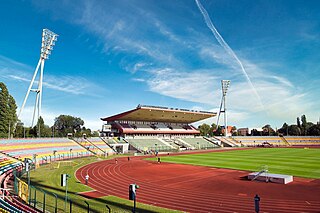
The Friedrich-Ludwig-Jahn-Sportpark is a multi-purpose sports complex located in the western part of the locality of Prenzlauer Berg in the borough of Pankow in Berlin. The sports complex covers an area of approximately 22 hectares and comprises several facilities. The main building is the Friedrich-Ludwig-Jahn-Stadion. The stadium is the third-largest stadium in Berlin, after the Olympiastadion and the Stadion An der Alten Försterei, with a capacity of approximately 20,000 seats, of which 15,000 are covered. Currently, the main tenants of the stadium are VSG Altglienicke and Berlin Thunder. Friedrich-Ludwig-Jahn-Sportpark was the venue for the 2018 World Para Athletics European Championships.
Mathilde Bonnefoy is a French film editor and director who was nominated for an ACE Eddie Award for the editing of the film Run Lola Run (1998) and who won the award for editing the documentary Citizenfour (2014). She and her husband Dirk Wilutzky additionally served as producers of Citizenfour with its director Laura Poitras, and the three received the 2014 Academy Award for Best Documentary Feature.
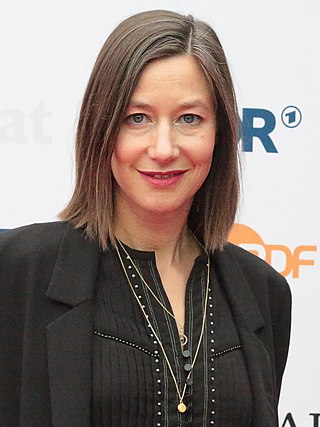
Johanna Wokalek is a German stage and film actress. A student of Klaus Maria Brandauer, she received critical recognition and three newcomer awards for her performance in the play Rose Bernd. Wokalek is best known for her award-winning appearances in the German films Hierankl, Barfuss, and The Baader Meinhof Complex. She received the Bambi award for her portrayal of the Red Army Faction member Gudrun Ensslin in 2008. She played the lead role in the film Pope Joan in 2009.

The Union of German Scouts in South West Africa, the first German oriented Scouting organization, was founded in 1928 in South West Africa and dissolved by the South African administration in 1939 on the outbreak of World War II. The current association, Deutscher Pfadfinderbund in Namibia, was founded in the 1960s, under the name Deutscher Pfadfinderbund Südwestafrika.
Niki Reiser is a Swiss film score composer and flautist. He is considered one of the most outstanding film composers of the German-speaking countries, winning the German Film Award five times. His debut was in 1986 the score for the film Du mich auch, directed by Dani Levy, for whom he has composed all further scores. He had his breakthrough with the music for the film Beyond Silence, directed by Caroline Link in 1996.
Der Faust, officially Deutscher Theaterpreis Der Faust, is a German theatre prize, a national prize from 2006. It is awarded annually by the organizations Deutscher Bühnenverein, Kulturstiftung der Länder, Deutsche Akademie der Darstellenden Künste and the state in which the award ceremony is held. The trophy was designed by the Austrian stage designer Erich Wonder.

Albrecht Abraham Schuch is a German actor. He is the recipient of several accolades, including four German Film Awards, a Bavarian Film Award, and a German Television Award. He was nominated for a BAFTA Award for Best Actor in a Supporting Role for his performance in All Quiet on the Western Front (2022).

Rainer Michael Müller is a German politician of the Social Democratic Party (SPD) who served as Governing Mayor of Berlin from 2014 to 2021 as a member of the German Bundestag since the 2021 elections, representing the Berlin-Charlottenburg-Wilmersdorf district.

Björn Höcke is a German politician and a member of Alternative for Germany (AfD). Along with Andreas Kalbitz, Höcke was the leader of the AfD's far-right Der Flügel faction, which the German government's Federal Office for the Protection of the Constitution declared a right-wing extremist organization.
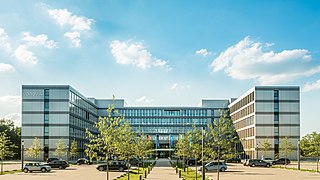
Vonovia is a European multinational real estate company based in Bochum, North Rhine-Westphalia. Its history goes back to Deutsche Annington, which merged with GAGFAH and was subsequently renamed Vonovia. The company currently owns around 565,000 apartments in Germany, Sweden, and Austria, establishing it a significant market player in these countries. Vonovia is a member of the DAX 40 and STOXX Europe 600 blue-chip indexes.

Wiedemann & Berg Film is a German film production company founded by Quirin Berg and Max Wiedemann in 2003. The company's first movie The Lives of Others won the Academy Award for Best Foreign Language Film in 2007.
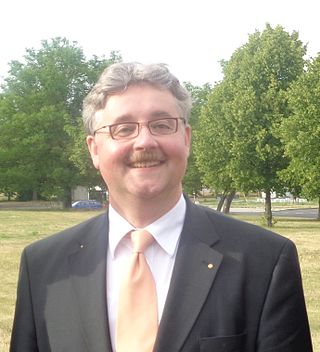
Matthias Stickler is a German historian.

Alexander Scheer is a German actor and musician. He has won several national awards for his performances in film and theater, including one German Film Award for "Best Actor in a Leading Role" and one Bavarian Film Award for "Best Actor", both in the year 2019.
Günther Rühle was a German theatre critic, book author and theatre manager. He directed the feuilleton (editorial/entertainment) sections of major newspapers and was regarded as an influential theatre critic, beginning in the 1960s. He managed the Schauspiel Frankfurt from 1985 to 1990. Rühle was a member of the PEN-Zentrum Deutschland. From 1993 to 1999, he was president of the Deutsche Akademie der Darstellenden Künste in Frankfurt. He published books about the history of theatre in Germany, and its criticism.
















